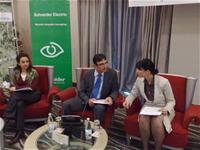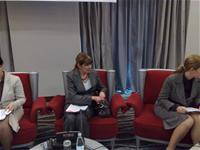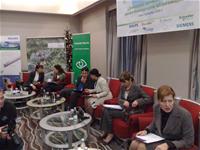Video: Bulgaria has chosen the path to low carbon economy
Adelina Marini, December 10, 2009
Finally Bulgaria took the road to green economy with high energy efficiency and with plans to stimulate renewable energy sources (RES). Although the country is a member of the EU for almost 3 years where low carbon economy is a key issue for a long time, Bulgaria has not shown any indications of movement in this direction. But yesterday, at a conference "Bulgaria is going to low carbon economy" organised by the Ministry of economy, energy and tourism, the Ministry of the environment and with the support of the American Chamber in Bulgaria, a new beginning has been put to this long, and quite often expensive, process.
 According to the minister of energy Traycho Traykov, for now Bulgaria is not marking an actual start but is just putting a post of the beginning to measure the carbonization of Bulgarian economy. He also said that the issue of low carbon economy was central for his ministry and the government. It will be in the centre of the new energy strategy being prepared and expected to be finalized in the beginning of the term of the new government (established in July this year).
According to the minister of energy Traycho Traykov, for now Bulgaria is not marking an actual start but is just putting a post of the beginning to measure the carbonization of Bulgarian economy. He also said that the issue of low carbon economy was central for his ministry and the government. It will be in the centre of the new energy strategy being prepared and expected to be finalized in the beginning of the term of the new government (established in July this year).
An integral part of the energy strategy would be renewable energy. By 2020, according to the decisions of the EU, all member states must get 20% of their electricity from RES. This will require a lot of investments from the business but the government is keen on stimulating such type of investments. But the questions is how? One of the ways is financing to be secured by the sale of carbon quotas. This is why Bulgaria insists a possible Copenhagen agreement to guarantee the right of countries with carbon surpluses to trade them after 2010 when the term of the current trade scheme under the Kyoto protocol will expire.
If this does not happen, the minister of environment and waters Nona Karadzhova explained  that a plan B was being prepared. At the moment the Ministry is holding intensive negotiations for the realisation of green investments scheme. He refused to elaborate bu promised that by March or April she could be more specific. However, the National Allocation Plan is still not approved, although it is ready but is lagging between different ministry for coordination.
that a plan B was being prepared. At the moment the Ministry is holding intensive negotiations for the realisation of green investments scheme. He refused to elaborate bu promised that by March or April she could be more specific. However, the National Allocation Plan is still not approved, although it is ready but is lagging between different ministry for coordination.
In the meantime, the American Trade Chamber in Bulgaria presented a white paper, containing the main obstacles for RES investments as well as some recommendation to the government. In the document as a main obstacle the low capacity of the electricity network is outlined - the applications for connections are in times more than the current possibilities of the network. In addition, the electricity operators do not comply with the RES legislation of Bulgaria to give a priority connection for RES. The financing of the expenses for improvement of the electricity infrastructure is also not transparent and clear.
The mechanism for defining prices is also one of the main impediments for investors in RES as well as the lack of coordination of stimuli for RES with EU's targets 20/20/20, which means by 2020 20% reduction of greenhouse gas emissions and 20% of the electricity to be from RES.
This is why the AmCham proposes the applications for good projects to be given priority before those projects that are speculative or not working. The Chamber also insists for an indicative timetable for realisation and connection to the network. Financing of enlargement of the capacity of the network through higher returns of the assets of the National Electricity Company (NEC). The Chamber asks the decisions in Copenhagen to be duly reflected in national legislation.
For now the ministers of economy and of the environment say they are determined to work closely with the business in this direction.
Now there is more clarity on Bulgaria's position for the UN climate change conference which started on Monday in Copenhagen. Next week Ms. Nona Karadzhova will present the Bulgarian position at the conference. After saying that it was not normal Bulgaria to be the most energy consuming economy in the EU, Ms. Karadzhova said that when the carbon contribution is being defined, GDP per capita should also be taken into account. In fact, this is the type of measurement is being used by China and India.
Bulgaria was in the group of new EU member states that insisted if the EU committed to 30% reduction after Copenhagen, the largest share to be taken by the richer member states. Beside this, our country insists on banking the unused carbon quotas after 2012. If this cannot be achieved, then there is an opportunity for agreement within the EU, these surpluses to be deducted from the commitment of the country after 2012.
 The problem with financing the efforts of developing and poor states is still not solved. The EU has indicated a specific amount of money to finance these efforts by 2020 but this amount must be negotiated in Copenhagen. Within the EU this problem is also unsolved. The EU is now agreeing the criteria for financing poor countries. Ms. Karadzhova was convinced that the EU would reach an agreement that would allow Bulgaria to realise its commitments.
The problem with financing the efforts of developing and poor states is still not solved. The EU has indicated a specific amount of money to finance these efforts by 2020 but this amount must be negotiated in Copenhagen. Within the EU this problem is also unsolved. The EU is now agreeing the criteria for financing poor countries. Ms. Karadzhova was convinced that the EU would reach an agreement that would allow Bulgaria to realise its commitments.
She also said that many of the projects for construction of solar installations in an early stage will be temporarily frozen until the problem with mass expropriation of agriculture land is fully analyzed. She spoke more in detail in the interview above (in Bulgarian).
 | © White House press service
| © White House press service | © COP15
| © COP15 | © COP15
| © COP15